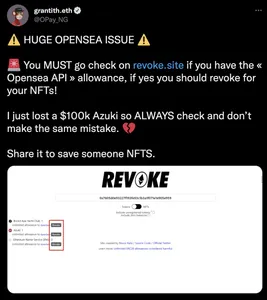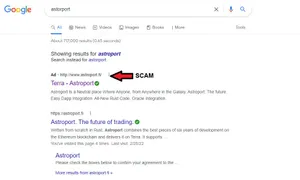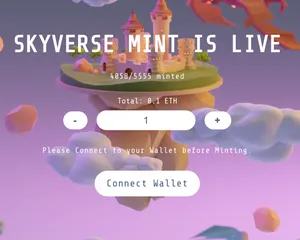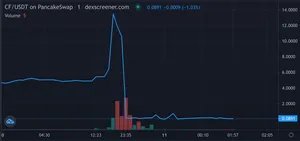Levine responded, "I think of myself as like a fairly cynical person. And that was so much more cynical than how I would've described farming. You're just like, well, I'm in the Ponzi business and it's pretty good."
FTX founder Sam Bankman-Fried tries to explain yield farming and it's just a ponzi
- "FTX/ Defi: If it looks like a duck and quacks like a duck . . . ", Financial Times
133 NFTs valued at $2.4 million stolen when hacked Bored Apes Instagram advertises fake land airdrop
The post invited people to visit a website that prompted users to connect their wallets in order to receive the airdrop. Users who did so found their NFTs transferred out of their wallet to the scammer. So far, 44 people have fallen for the scam site, transferring a total of 133 NFTs with an estimated value of around $2.4 million. The stolen NFTs included items from pricey collections including Bored Apes, Mutant Apes, Bored Ape Kennel Club, and CloneX. Several of the NFTs had previously been sold for over $100,000 each.
- Tweet by Bored Ape Yacht Club
- Scammer wallet on Etherscan
Epoch Times writers mass-mail unsolicited "newspaper" promoting crypto
Byrne and Collins published the paper via their co-founded company Streetlight Equity. The firm has also published ostensibly economic-focused articles that include conspiracy theories about how U.S. sanctions on Russia are all a part of a plan to "force the left's green agenda", and rail against pandemic lockdowns.
This is not the first unsolicited newspaper from the Epoch Times or its associates; the Falun Gong-associated and strongly anti-Chinese Communist Party publication previously distributed an unsolicited "special edition" which described COVID-19 as the "CCP virus". This led to pushback from Canadian postal union, who urged the Canadian government to ban its distribution as hate speech they feared would endanger Asian Canadians. Epoch Times have also spread QAnon and anti-vaccine conspiracy theories, spread false claims of fraud in the 2020 United States presidential election, and promoted far-right politicians in Europe.
Binance gave Putin regime information on users who donated to opposition leader Alexei Navalny
Navalny has been imprisoned in Russia since returning in January 2021, shortly after recovering from poisoning: an attempt on his life reportedly ordered by Putin. While in prison, Navalny's foundation has encouraged people to donate cryptocurrency using Binance. They have raised more than 670 Bitcoin ($28 million) so far, despite the Russian government outlawing the foundation and labeling it a terrorist organization. Donors to Navalny's cause now face potentially serious danger as they've been identified to the Putin regime by Binance.
Crypto proponents have long promoted the technology's potential to fund individuals who are targeted by oppressive regimes, and to allow anonymous and untraceable donations.
AkuDreams NFT project earns $34 million that its team will never be able to withdraw
The contract suffered from several flaws, however. The first allowed an exploiter to stop all refunds and withdrawals from the contract. Luckily for the team, the exploiter was well-intentioned and only intended to highlight the issue; they removed the block shortly after, leaving a message urging the team to have their contracts audited before release.
AkuDreams were not so lucky with the second issue. A bug in the code failed to account for users minting multiple NFTs in a single transaction, which made it so that the claimProjectFunds function that would allow the team to withdraw their earnings can never successfully execute. This means that the team can never withdraw the 11,539 ETH ($34 million) earned from the NFT sales — it is stuck there forever.
Hacker pulls $1 million from defi project, then destroys contract without withdrawing the funds
Scammers phish $4.3 million from Terra users in ten days using Google Ads
52 different people fell for the scam, losing a total of around $4.3 million in assets. The scammers appeared to be targeting high-value wallets, with only two accounts transferring less than $1,000. 24 individual wallets were scammed for more than $10,000 each, 7 wallets lost more than $100,000, and one user lost almost $1.4 million.
Rogue Society team resurfaces after being called out for rug pulling $5.5 million
Following a thread by zachxbt outlining the team's rug pull, the project founder made the first post in the project Discord since December, announcing a theme song competition with no acknowledgement of the team's absence and lack of progress.
This event once again shows how it is people like zachxbt who are left to try to hold project creators accountable in the absence of reasonable regulation or enforcement.
Binance adds a branded hashtag to Twitter that closely resembles a swastika
More than a few people expressed shock at seeing what they believed to be a hate symbol on their Twitter feeds from a large brand. The date of release only made things worse — April 20 is celebrated among fascists because it is Hitler's birthday. Tweets from Binance's official Twitter account and the Twitter account of founder and CEO Changpeng Zhao (known as "CZ") were quickly deleted, though the emojis remained. Several hours later, Binance changed the emoji to a globe with the Binance logo.
Twitter doesn't publicly list how much it costs to obtain a branded hashtag, though most articles I could find listed the price at around $1 million. I'm not sure if this is per hashtag or per emoji — the new emoji appears on several related hashtags.
Rich Bulls Club team resurfaces after being called out for rug pulling $3.7 million
Two hours after zachxbt published his research, the team made their first post in three months, with multiple excuses for the issues zachxbt highlighted.
NFT influencer 0x_fxnction suffers $240,000 wallet compromise
He said he hadn't used the wallet to mint any NFTs since October, and said he had revoked all access to minting websites since then. He wrote that he was unsure how the compromise had happened: "My best guess: an old minting site from October still had access to my wallet, even after 'revoking' happened in Phantom.... But honestly, it's just a guess."
Developers drain over $1.1 million from $CHEDDA
Members of the Chedda team claimed on Discord that they were not behind it, and that it had been done by an outsourced development team who was working on the projects farming and staking. "They technically should've been within contract, but they robbed us," wrote Discord moderator Ali Michelle (referring to legal contracts rather than smart contracts). "They were in contract so it would be illegal and full on theft, i believe". Despite the devastating loss, Michelle urged remaining members of the community to "hodl and help us bring this back to life!"
The project had been audited by CertiK, who were quick to note that the contract containing the function used to drain funds was "not in CertiK's audit scope".
Atari cuts ties with their "Atari Token" partner
Atari Token was described as "decentralized cryptocurrency that was created to become the token of reference for the interactive entertainment industry". It launched in November 2020, tanking in price immediately on release. Despite a brief boom around March 2021, the token has mostly traded below its launch price.
In the press release, Atari wrote, "Atari disclaims any interest in the [...] Joint Venture, currently promoted as Atari Tokens, and related websites, whitepapers and social media channels are unlicensed, unsanctioned and are outside the control of Atari." They also wrote that they would be replacing existing $ATRI tokens with new tokens in the future. Atari wrote that the termination of the hotel and casino agreements resulted in an €11 million ($11.8 million) write-off, but that financial impact of the token changes wouldn't be disclosed until the FY22 report.
$650,000 phishing attack against MetaMask user reveals that credentials are automatically backed up to iCloud
It's not yet clear if others have been affected by the same type of attack, but MetaMask tweeted instructions for iCloud users on how to turn off the automatic backups. Most people seemed to have previously been unaware that this data was being backed up in iCloud. MetaMask turned off replies on their tweet announcement, apparently anticipating the outrage from their users. Iacovone was among the outraged, writing, "Keep exposing MetaMask until they do what is right and take care of this issue and the people affected by it".
Palisade discloses infectious XSS vulnerability on Rarible that could have arbitrarily changed NFT listing data and transactions
The researchers were able to inject malicious code into the profile photo on Rarible, which only required a person to visit the malicious profile in order to run. This code could have then "infected" other signed-in users' profile photos, increasing the spread of the vulnerability to anyone who then visited their profiles. Once infected, the code would persist across all pages on Rarible, and could change arbitrary data on NFT listings, modify smart contract interactions, leak or modify profile information, or prompt users to sign arbitrary messages.
In an example, the researchers showed how a listing of a Bored Ape (pricey NFTs which currently have a floor price ~100 ETH / $290,000) could be modified for an impacted user to appear as though it was listed for only 1 ETH (~$2,900). A user who attempted to buy the apparently massively-discounted NFT could then be prompted to approve a sale transaction which would actually run a setApprovalForAll call that would allow the attackers to steal crypto and NFTs from the user's wallet.
This bug was the second Rarible vulnerability that was publicly disclosed this week, following a vulnerability with SVG NFTs disclosed by Check Point Research on April 14.
After the security researchers responsibly disclosed the vulnerability, which could have quickly wreaked havoc across Rarible's entire userbase, Rarible patched the issue and awarded them a bug bounty of $5,000. Good luck to Rarible if the next people who find a bug are even slightly more motivated by money than they are by ethics.
Prominent former defi developer Andre Cronje calls for crypto regulation as he founds an investment banking company
The reasoning may have just become clear, as Cronje published a blog post titled "The rise and fall of crypto culture" in which he wrote, "Crypto culture has strangled crypto ethos... I now more than ever see the need, or even necessity for regulation, not as a mechanism to prevent, but as a mechanism to protect. Its like a child trying to stick their finger into a electric outlet, you stop them, before they can learn why they shouldn't. One day they will understand, but not today." He remained optimistic about the prospects of crypto if regulation is introduced: "We will see the rise of a new blockchain economy, not one driven by greed, but instead driven by trust, not trustlessness."
Not everyone was impressed by his apparent change in tune. Twitter user 0xCana wrote, "andre cronje with the gigagrift walking away with over 1 billion dollars generated from crypto and then exits the space, rails against 'get rich quick mentalities' and advocates for strict regulations and then founds an investment banking company. incredible."
- "The rise and fall of crypto culture", Andre Cronje on Medium
- Tweet by 0xCana
2omb and Redemption defi projects endure repeated flash loan attacks
Starting on April 18, the projects were targeted with a series of flash loan attacks. The project faced a total of 267 flash loan attacks within one day, leading to major volatility in the ostensibly stable coin. In an impressive display of optimism, a project team member wrote, "This has caused a large price pump. (Also benefited with 3% more burned tokens in fees.) The outcome and intent of the person who has done this, is unknown and it may work in our favour, Do not panic, and do not buy or sell until stable." The attacker made a profit of around $190,000 from the attacks.
Beanstalk Farms stablecoin project loses $182 million to exploit
Estimated damages to the project were higher than the amount the hacker was able to take for themselves — around $182 million. The $BEAN token, once pegged to $1, dropped to nearly 0. The project creator wrote in the Discord, "We are fucked. This project has not had any venture backing, so it is highly unlikely there is any sort of bail out coming." However, they were later slightly more optimistic, writing, "it may also be the start of something good... there may be a path forward. We don't want to comment on next steps until that path is at least visible to us" while reiterating that a bail-out was "highly unlikely". They also told members of their community that they had contacted the FBI about the theft.
Someone successfully games raffle for popular NFT allowlist with Sybil attack
This did not go over so well for the people who were eager to get a spot in line to mint NFTs that cost 2.5 ETH ($7,650), but was selling with a floor price of 13.1 ETH ($40,000) on the secondary market shortly after the mint completed. If the person behind the Sybil scheme flipped their NFTs for the current floor price, they could make upwards of $1.6 million in profit.
Pseudonymous Gem cofounder revealed to be hiding a history of alleged sexual abuse, some targeting children
Following the publication of the BuzzFeed article on April 16, the Gem Discord erupted in anger — apparently discovering for the first time that Gem had known Thompson's real identity for quite a lot longer than they had let on. Some members accused the team of lying and trying to cover up who Thompson was, demanding the team explain themselves. The Gem Discord bot was subsequently configured to block links to BuzzFeed.com, so people couldn't post the exposé article.
Crypto culture has embraced pseudonymity to such an enormous degree that not only is it common for everyday traders to cloak their identities behind wallet addresses or pseudonyms, but for founders and prominent members of major projects to do so as well. This is not the first time this has enabled deception, such as in the case where a chief developer of a defi project later being unmasked as a man with a history of financial crimes and other shadiness.
Rikkei Finance exploited for $1 million
Unicorn Nodes defi project rug pulls hours after launch
Monero holders plan a bank run
To try to test this theory, Monero users have scheduled what is basically a bank run: they are encouraging all users to try to move their Monero out of exchanges on April 18. Some have claimed that exchanges including Binance and Huobi have frozen withdrawals of Monero in anticipation of the mass-withdrawal, in an effort to prevent their lack of reserves from being discovered. Indeed, Huobi suspended XMR deposits and withdrawals 10 days ago and has yet to restore the functionality, which they say is due to a wallet upgrade. Binance also shows "withdrawal suspended" on its status page as of April 14.
- " 'The Monerun' scheduled for April 18th, Monero's 8th birthday", Monero Observer
- "The Monerun", on r/CryptoCurrency
Archie Comics announces "Archiverse" NFT project to overwhelmingly negative reception
Reception to the project was swift and overwhelmingly negative. Even the biggest Archie fans who already populated the existing Archie Comics Discord (which saw the addition of crypto channels on the day of the announcement) seemed largely unhappy with the news, and a plan to migrate to their own server free from the NFT and crypto chat was quickly hatched.
Influencer "The Real Tarzann" (aka Mike Holston) rug pulls NFT project to the tune of $700,000
The project ultimately minted only 3,179 of the 5,500 planned NFTs, but at 0.068 ETH a pop this still brought in 216 ETH (just under $700,000). The project quickly reduced the supply to avoid the appearance of a lukewarm mint. The NFTs themselves are all illustrations of men wearing various animal heads as headdresses — an odd choice for an animal conservation project.
In November 2021, much of the team suddenly disappeared and stopped posting to Instagram or Twitter. One mod in the Discord has remained positive for months since the apparent rug pull, urging the remaining community members to remain positive. In March 2022, the mod wrote, "I need a huge favor this week from everyone to not spam the accounts of NFT.com guys and Tarzan, it is EXTREMELY IMPORTANT that stops if we want this to comeback, hopefully huge news to follow this week." No such news appears to have come.
Bug discovered in popular Rarible platform: NFTs could execute malicious JavaScript
The vulnerability was discovered after Taiwanese singer Jay Chou had a Bored Ape NFT stolen in April, prompting the researchers to look into the details of the attack. After the researchers responsibly disclosed their findings to Rarible, Rarible implemented a fix. Rarible removed the ability for users to upload SVG files to patch the vulnerability; it's not clear if they intend to restore that functionality.
Authorities link Axie Infinity hack to North Korean Lazarus hacking group
- "Community Alert: Ronin Validators Compromised", Ronin Newsletter
- U.S. Department of Treasury announcement showing the sanctioned wallet address
- Attacker wallet on Etherscan
RCMP says more than $2 million has been lost to crypto scams in Richmond, B.C. since January
Shareholders file a class-action suit against Coinbase over deceptively positive statements
Fake SkyVerse project draws in more than $150,000
NFT collector gets $280 top bid for the Jack Dorsey tweet NFT he bought for $2.9 million last year
Ethereum transition to proof-of-stake delayed again, as is tradition
The project has been delayed so many times that it has become a bit of a running joke — crypto critics regularly describe the Ethereum PoS migration as something that has been "only six months away" for several years now. Meanwhile, it has proven a useful way for Ethereum fans to dismiss the valid concerns about the enormous energy expenditure of their preferred blockchain, as though enormous emissions and e-waste are somehow a non-issue if there is some vague plan at some perpetually-in-the-future point to move away from them.
Anyway, Ethereum developers have projected new levels of optimism lately, with several of them describing "the merge" as imminent — I believe a June timeframe was the popular estimate. Unfortunately, this appears to have been just as unachievable as the prior "deadlines", with an Ethereum core developer stating it was now looking like it wouldn't happen until some time this autumn. This is particularly brutal timing, given Nilay Patel's interview yesterday with a16z's Chris Dixon, where he confidently pointed to an early July "merge" date (only to become substantially less confident when pressed on specifics). Anyway, see you this fall for the next hype cycle — between now and then, Ethereum will have again consumed energy comparable to the amounts used annually by some small countries, for little if any useful purpose.
- Tweet by Tim Beiko
- "Ethereum energy consumption", Ethereum.org
Texas Securities Commissioner issues emergency order to stop a metaverse casino
In the order, the Commissioner alleged that the project was "leveraging interest in metaverses to perpetrate a high-tech fraudulent securities offering", and had been falsely claiming to their followers that securities laws don't apply to NFTs. "They are misleading purchasers by claiming they can simply avoid securities regulation by implementing illusory features or use different terminology," the Commissioner's announcement said.
Science fiction author Pierce Brown cancels NFT project after negative fan response
The day after the announcement, Brown released a statement saying that he had been drawn in by the hope that NFTs would allow him to avoid "big companies whose sole focus is strong-arming away the rights to projects they've never been a part of to turn a big profit." He wrote, "I felt that if I didn't jump on it myself, someone else would, without the love, care, and artistry we believe in". He concluded that, given the response from his fans, he would not be continuing the NFT project. Some encouraged him to use the artwork that had already been created for merchandise or other non-NFT art sales.
- Tweet by Pierce Brown announcing the project
- Tweet by Pierce Brown announcing the project's cancellation
Someone once again appears to trade on insider knowledge of Coinbase listings
The day after the announcement, crypto influencer "Cobie" wrote on Twitter, "Found an ETH address that bought hundreds of thousands of dollars of tokens exclusively featured in the Coinbase Asset Listing post about 24 hours before it was published, rofl". The wallet had spent around $400,000 on multiple currencies listed in the announcement, which certainly appears as though they knew about the contents of the announcement before it was published.
This is not the first time allegations of insider trading have been made based on Coinbase announcements. In February, a trader made a profit of over $700,000 by trading on what appeared to be advance knowledge of two upcoming Coinbase announcements.
The Wikimedia community formally requests that the Wikimedia Foundation no longer accept cryptocurrency donations
The community member writing the closing summary of the discussion wrote that "Common arguments in support include: issues of environmental sustainability, that accepting cryptocurrencies constitutes implicit endorsement of the issues surrounding cryptocurrencies, and community issues with the risk to the movement's reputation for accepting cryptocurrencies.... Excluding new accounts and unregistered users, the tally is 232 to 94, or 71.17% in support of the proposal. These results indicate overall community support, with a significant minority in opposition. Thus, the Wikimedia community requests that the Wikimedia Foundation stop accepting cryptocurrency donations."
Attacker cashes out more than $11 million from Elephant Money in a flash loan attack
Elephant Money is a defi project with some questionable promises — its Twitter account advertises that people can "earn 672% APY", and a recent tweet encouraged people to use Elephant Money "as your new bank: Your share of ELEPHANT tokens can be compared to your debit account, except that it also generates you money. Stampede Perpetual Bonds is your retirement fund." Hopefully no one took them up on their suggestion to put their debit account balance or retirement money into the project.
Celsius stops allowing non-accredited investors in the United States to lend out their crypto
Individual accreditation is based on net worth or income: only those with net worth above $1 million, or yearly income above $200,000, qualify. American Celsius users were largely unhappy with the change, with one writing, "Celsius Network making the rich richer. Shameful."
Ichi token plummets 90% after Rari liquidity pool is emptied
One Rari developer blamed Ichi for the disaster, writing, "Fuse is a permissionless protocol. Pool operators are responsible for following best practices to avoid situations like this one". Rari Capital's official Twitter account also blamed Ichi, stating, "This is a permissionless pool that is owned and operated by Ichi. We hope to see an announcement from Ichi regarding redemption strategies and next steps to make users whole."
In the FAQ about the incident, Ichi wrote that they had allowed such a high LTV ratio in the pool because they expected "users would make responsible decisions that would benefit the community". There is currently around $30 million of bad debt in the liquidity pool.
NFT collector suffers wallet compromise and loses over 100 NFTs, priced at over $600,000
Attacker drains Creat Future tokens through flaw that allows anyone to transfer the contents of another person's wallet
$CF was an asset belonging to Creat Future, an early-stage defi project. Some have speculated that the hack was an inside job, and the vulnerable function was added intentionally.
First crypto burger purchase at Bored Ape restaurant illustrates why people don't widely do this
A customer ordered two combo meals, which he purchased by using his mobile crypto wallet to transfer 2 $APE. I was able to track down the transaction, and at the exact time of transfer, 2 $APE were priced at $21.92. The value of $APE has increased by 20% since then, so the purchaser lost out on those earnings by spending them at that time (compared to cash, which is worth roughly the same as it was 10 days ago). This is a (very small) example of why people don't tend to use as currency the same assets they are expecting to increase substantially in value. Furthermore, the purchaser had to agree to an estimated $10 in gas fees when he confirmed the transaction — half as much again as the price of the meal. The transaction ultimately cost the purchaser $4.66 in gas due to fortunately low rates that day, but it was a transaction fee that wouldn't exist if they used cash, or would be substantially smaller and typically absorbed by the restaurant if using a credit card.
Painful financial implications aside, a public transaction record means it's now trivial for anyone to see who is purchasing food at the restaurant using crypto in real time — something that has concerning implications for victims of stalking and other abuse if implemented more widely, as well as just for average people who enjoy having some degree of privacy.
Anyway, hopefully the food's good — assuming the person had any appetite left after looking at their food containers depicting an ape with green skin sloughing off its face.
Gripnr seeks to financialize your Dungeons & Dragons games
A company called Gripnr is already working to line up NFT pre-sales, despite acknowledging that they have no idea how they will prevent fraudulent data input — an issue commonly known as the oracle problem. It's also unclear how they intend to change the game so that it's sufficiently different from the Wizards of the Coasts game that they will not face legal action (an issue that ended another crypto project planned to be based around a WotC game). We can only hope that none of this may last long enough to become an issue, given that Gripnr have come up with an idea that I can't imagine appealing to a single person who's ever played D&D.
- "NFTs Are Here to Ruin D&D", Gizmodo
Legal action begins against developer who solicited investments to build an OpenSea competitor, then used it to fund his NFT trading
Meanwhile, Gaye used the project Twitter account to promote his own NFT collection. He also took the donated funds and used them to buy NFTs. When pressed on this in the project's Telegram chat, he wrote, "Im buying NFTs because its my ETH and thats what I wanted to do." After crypto scam investigator zachxbt wrote about Gaye's scams, Gaye threatened to "put him in the ground if we ever meet in person".
Gaye has spent almost 400 ETH on NFTs since beginning to collect donations for his project — equivalent to over $1 million. He has also sold NFTs for a total of around 315 ETH (roughly breaking even with the amount he spent on NFTs, if looking at the ETH prices at time of trade), and amassed a substantial number of NFTs he still holds.
Blockchain bridge for the WonderHero play-to-earn game is exploited
Starstream treasury drained of $4 million
Scammer creates a fake site to revoke wallet permissions, then pretends there is an OpenSea vulnerability to trick people into using it
 A tweet falsely claiming an OpenSea vulnerability, linking to a scam permission revocation website (attribution)
A tweet falsely claiming an OpenSea vulnerability, linking to a scam permission revocation website (attribution)- Scam wallet on Etherscan
- Tweet thread by 0xQuit
Star Trek gets into NFTs
- "First NFT Collection from Paramount Global and RECUR Partnership to Drop with Star Trek on April 9", press release on StarTrek.com
Ubisoft abandons Tom Clancy's Ghost Recon Breakpoint after shoehorning NFTs into it
Although the Formula 1 blockchain game that shut down earlier this month made halfhearted promises to allow NFT holders to swap their NFTs for ones used in a different game, Ubisoft has made no such promises.
Another $1 million lawsuit is filed against OpenSea for stolen apes
The language in the lawsuit is very similar to the stolen ape lawsuit filed February 18, which is not surprising because the plaintiffs are using some of the same lawyers. Vice interviewed one of the lawyers, and determined that the somewhat odd wording refers to the issue in which OpenSea users didn't realize their old listings of NFTs at lower prices were still active.













































